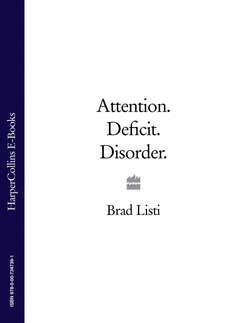Читать книгу Attention. Deficit. Disorder. - Brad Listi - Страница 9
3
ОглавлениеEarlier in the year, the filmmaker Stanley Kubrick and the baseball player Joe DiMaggio had died within a day of each other. Kubrick passed away on March 7, 1999. A heart attack did him in. DiMaggio died on March 8, of lung cancer and pneumonia. I learned about both deaths on the morning of March 9. My alarm clock went off, same as usual, and I heard Bob Edwards talking about their deaths on National Public Radio. I remember lying in bed, looking at the ceiling, hearing the news. I found myself feeling sad in a vague and peculiar kind of way.
Later that same day, I was driving around Boulder, running errands, headed north on Twenty-eighth Street, trying to make a left turn. Up ahead I saw two little girls standing on the side of the road, darling little Japanese girls, sisters holding hands. They darted out into the road, right in front of a guy in an Oldsmobile Cutlass. Traffic was thick, so the guy wasn’t going very fast—maybe twenty miles per hour. He slammed on his brakes, but by then, it was too late. The nose of the Olds struck the little girls, and they popped up in the air like rag dolls. One of them landed on the street. The other one landed on the hood. It was terribly surreal.
Everything started happening fast. Suddenly, I was out of my Jeep and running across the street. I arrived at the scene, and the little girls were lying there. The younger one was wailing. The older one was trembling, in shock. Both were conscious, and there wasn’t any blood. Onlookers were rushing in from every direction. Everyone was crowding in around the girls, trying to comfort them, asking them if they were all right. I felt nauseous. I looked to my left and saw a woman standing there. By the looks of her, she was a mother. She had her hands on her head, as though she were wearing a wig and the wind might blow it away. “Oh my God,” she kept saying. “Oh my God, oh my God…”
I took my jacket off and tried to drape it over one of the little girls, the older one. I’d read somewhere that people injured in accidents should be covered with blankets or coats, to keep them warm, to treat them for shock. The little girl wanted no part of my jacket. She threw it off her shoulders, looked at me, and started bawling. She said she wanted to go home. Having all of these strange adults around her was scaring her. I backed away, holding my jacket. I felt silly—dejected, almost.
Sirens rang in the distance.
The little girl sobbed.
“Don’t worry, sweetheart,” someone said to her. “Help is on the way.”
“I don’t want to go to jail,” she said.
Everyone assured her that she wouldn’t be going to jail.
The woman to my left crouched down and gave her a hug.
The driver of the Oldsmobile was short and middle-aged. He was wearing a Colorado Rockies cap, standing to my right with his hands in his pockets. He looked a little bit like Al Pacino, and he was oddly calm, talking to another onlooker.
“I didn’t see ’em,” he said. “I didn’t see ’em at all. They came out of nowhere. I had no way of seeing ’em. I didn’t see a thing until they were up on my hood. I didn’t see a thing. All of a sudden I looked up, and bam, there they were. There wasn’t even a crosswalk there. I couldn’t have seen ’em.”
An ambulance arrived, followed by two fire trucks and two cop cars. The circle of onlookers opened up, and the paramedics came through. The older girl kept saying that she wanted to go home and see her mommy. The little one just sat there crying. After a while, people started to disperse. I walked back over to my truck, climbed inside, and drove away. My hands were shaking, and I drove very slowly. It was a cold wintry day, and there were giant towering clouds rolling in over the mountains. It was a very strange afternoon.
